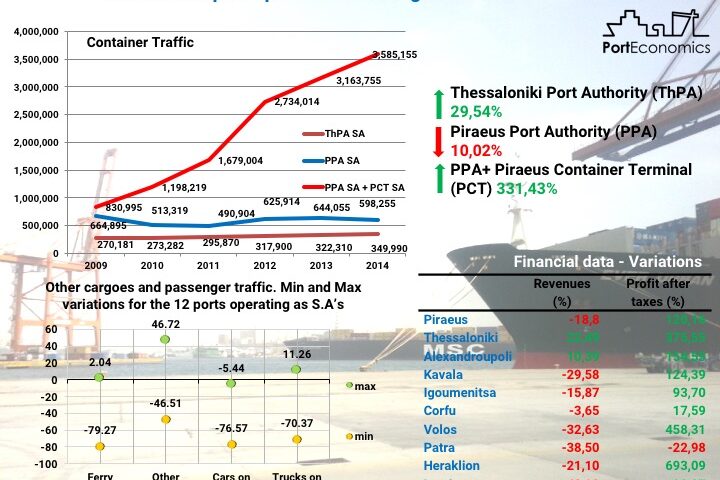By George Vaggelas
The Greek economy is going through the eighth year of economic recession as the economic crisis in Greece started at the end of 2008 and continues today. In this environment, Greek ports tried to respond to a series of challenges such as the reduction in consumption in the internal market, the reduction in the competitiveness of the Greek economy as well as some inherent challenges such as the resuction of ports personnel.
The PortGraphic outlines how Greek ports (and more specifically the 12 ports operating as Societe Anonymes) performed during this period of economic uncertainty. The analysis is based on the throughput and economic data official released by the respective port authorities.
Greek ports experienced great losses in almost all categories of cargo and passenger traffic. The exception has been container traffic. All ports registered a significant part of their throughput related with the ferry traffic (passengers, private cars and trucks). The same trend appeared in the case of dry bulk, liquid bulk and general cargoes as the respective throughput experienced a decrease ranging from -45,8% to -11,2%. The only exception in this category of traffic is the port of Alexandroupolis. The latter manged to increase the related traffic by 46,7%, yet the size of the particular traffic is relatively small comparing with the national port throughput and does not influence the overall trend.
The situation is totally different in the container traffic. Three out of four ports facilitating container traffic, increased their throughput, the most exceptional one registered at the container terminal of Piraeus,operated by Piraeus Container Terminal S.A. (P.C.T. S.A.) a subsidiary of COSCO Pacific .
The port of Piraeus increased the container traffic by 331,43% but this is solely attributed to the performance of the container terminal operated by P.C.T. The Piraeus Port Authority S.A. (PPA S.A.) which operates the rest of the container terminal lost 10,02% of its traffic. Despite that the port of Piraeus as a whole is the top performer in the containerised cargo traffic. The port of Thessaloniki gained 29,54% and the port of Volos increased the container traffic by 2,87%. The only port that lost container traffic between 2009-2014 is the port of Heraklion (-12%).
The significant decrease of throughput in almost all Greek ports had an impact on their revenues. With the exception of the port of Thessaloniki and Alexandroupoli all other ports experienced a decrease in their revenues.
The most impressive outcome of the data analysis is that despite the loss of traffic and the deacrease in their revenues, all ports (apart the port of Patras) managed to increase their profits!
This outcome can be attributed to two major factors: a) the reduction in the port employees salaries due to the programmes of fiscal adjustment of the Greek economy, which resulted in a reduction of the major cost element in Greek ports, b) the reduction in port’s personnel due to the fiscal adjustment programmes as many port employees retired while hiring new personnel was more or less forbidden.
One is certain though. The economic crisis forced Greek ports to alter their strategies and increase their extroversion in an effort to attract cargo traffic from neighboring countries and rival ports. Some of them continue to search to exploit new opportunities in specific categories of passenger (i.e. cruise) and/or cargo traffic, a move resulting in the enrichment of their port product and in some cases in the increase of port specialisation.













